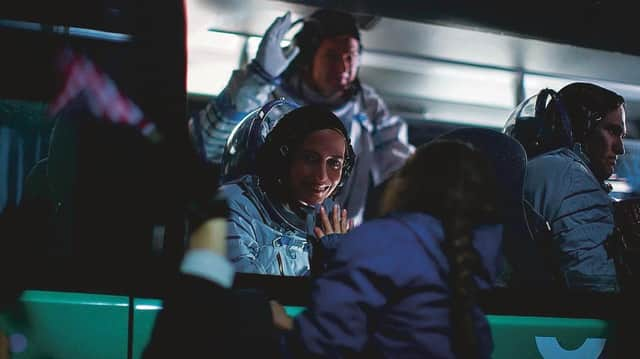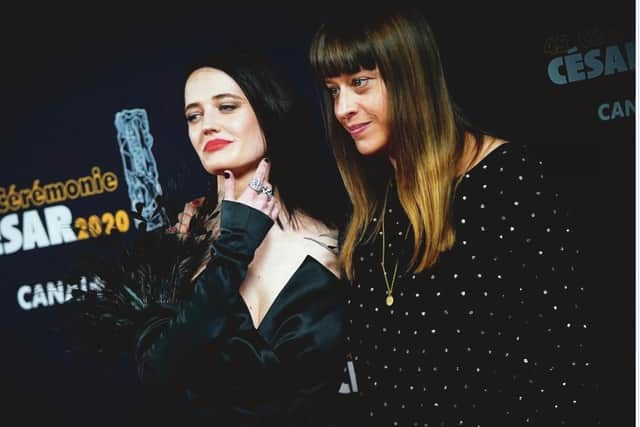Interview: Proxima director Alice Winocour on her Eva Green-starring astronaut movie


It’s the end of February and I’m sitting with French filmmaker Alice Winocour in a hotel in Glasgow discussing her third feature, the Eva Green-starring astronaut drama Proxima. There’s nothing particularly unusual about this. Winocour has flown in from Paris to attend Proxima’s UK premiere at the Glasgow Film Festival where interviews are a normal part of the publicity process. But we’re also in the immediate run-up to the coronavirus crisis hitting the UK. In less than a week, I’ll see my first film-goer wearing a face-mask – in a screening of Invisible Man, the last major studio movie to get a theatrical release. In less than three weeks, cinemas will close and Proxima’s spring release will be scrapped. In a month the world will have changed.
But while it’s business as usual when we meet, the fact that the looming health crisis never comes up once in our conversation does, in retrospect, feel a little odd – and not just because of the (understandable) denial this signifies. Revolving around an astronaut (Green) as she prepares to leave her young daughter to travel into space for the first time, the film examines the rigours of quarantine, the mental strain of isolation, the heartache of enforced separation and the complex emotions that arise when families can’t be together. In other words, it’s a film that might resonate more acutely with audiences now than it perhaps would have done a few months ago (Proxima is one of the first major movies scheduled for a UK release when cinemas re-open).
Advertisement
Hide AdFor Winocour, though, the idea for the movie grew out of her own experience of being a parent and a filmmaker. She wanted to explore the concept of separation from the point of view of a mother and a daughter (newcomer Zélie Boulant plays the child), but because she doesn’t subscribe to the very French cinematic tradition of making films that are explicitly autobiographical, she transposed her intimate feelings on the subject on to this story.
“I have a daughter the age of the little girl so I could really compare it with the world of cinema,” she says, drawing parallels between the huge collective effort it takes to pull off a film and the vast behind-the-scenes work that goes into launching someone into space. “Of course, we’re not risking our lives,” she adds, “but I think what is common is the idea of a mission and to really be in another world.”
There’s also something about space travel in movies that lends itself to exploring the psychological dimension of parenting. First Man, Ad Astra, Gravity and Interstellar all feature protagonists confronting abandonment issues, separation anxiety or loss amid the eerie silence of the cosmos – and even Ripley in the Alien movies is tortured by the pain of missing out on her daughter’s life after everything goes pear-shaped in the first film. “I think it’s because of this idea of Mother Earth and us being children of the Earth,” nods Winocour. “But it’s not only a poetical thing. In the Russian space programme, when you get out of the atmosphere, it’s called ‘umbilical separation.’”
With Proxima, Winocour has put her own spin on this mini-genre by setting the entire film on Earth and going into granular detail not just about the gruelling physical training that Green’s character, Sarah, has to endure to prepare herself for the physical trauma of going into space – something intensified by the entire industry being set up with male bodies in mind – but also the additional societal pressures she faces as a woman with a career that doesn’t fit neatly conceived ideas of motherhood. The latter was confirmed by an adviser on the film who trains astronauts for the European Space Agency. She told Winocour that she’d been amazed to discover that one of the female astronauts she’d been training for six months had a kid because she never mentioned it; whereas the first thing the male astronauts do when they arrive at training is show everyone pictures of their children and families.
“I think women remain silent about having children,” says Winocour. “I think we have learned as women that when it comes to work, having children is still considered a weakness.”


It’s something she’s done herself on film sets and one more reason she wanted to show a different kind of mother on screen, one that defies the idealised “perfect mother” trope that movies have a habit of perpetuating. It’s also partly why she cast Green in the lead. “Eva is this kind of Amazonian type who is very strong, but at the same time, she has a strangeness that to me is really attractive. It’s no coincidence that she has been in so many of Tim Burton’s movies.”
Advertisement
Hide AdGreen’s otherworldliness also chimes with the uniqueness of the film’s aesthetic. The movie may never leave Earth, but it still has an eerie, ethereal quality. In part that comes from being the first movie to be shot in the European Space Agency’s actual training facilities in Germany and the Baikonur Cosmodrome spaceport in Kazakhstan, something that allows the film to challenge Nasa’s dominance when it comes to pop culture representations of space travel. “I think that’s why the European Space Agency agreed to partner on the film,” says Winocour. “For me it was like discovering a completely new world.”
It’s a feeling amplified by Ryuichi Sakamoto’s organic score, which eschews the operatic bombast that has been de rigueur in space movies since Kubrick’s 2001 to make use of field recordings of the natural world. It’s something the renowned Japanese composer – who’s obsessed with Andrei Tarkovsky’s sci-fi masterpiece Solaris (a touchstone for Proxima too) – was already doing in his own work. In one of those happy creative coincidences, though, Winocour had already written a scene into Proxima in which one of her protagonist’s fellow astronauts goes out to record audio of nature ahead of the launch. “A real astronaut had told me he did this,” she says. “When you’re about to leave the Earth, that’s when you realise how important it is.”Proxima will be in cinemas from 31 July.
A message from the Editor
Advertisement
Hide AdThank you for reading this story on our website. While I have your attention, I also have an important request to make of you.
With the coronavirus lockdown having a major impact on many of our advertisers - and consequently the revenue we receive - we are more reliant than ever on you taking out a digital subscription.
Subscribe to scotsman.com and enjoy unlimited access to Scottish news and information online and on our app. With a digital subscription, you can read more than 5 articles, see fewer ads, enjoy faster load times, and get access to exclusive newsletters and content. Visit https://www.scotsman.com/subscriptions now to sign up.
Joy Yates
Editorial Director